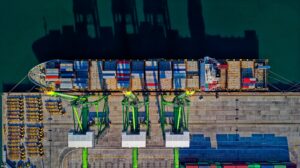
By Martin Nøkleberg
At the start of this year’s summer travel season, the European aviation industry faced disruptions and travel chaos. There are numerous factors contributing to the many delayed and cancelled flights and the hours-long queues for check-in and security controls. During the COVID-19 pandemic, airports and industry stakeholders, laid off tens of thousands of personnel. But as the traffic numbers have been rapidly increasing in the post-pandemic environment, the industry is now struggling to return to prior staffing levels to meet the commercial demands. Moreover, strikes among various groups of aviation workers have added extra pressure and slowdowns throughout Europe.
The COVID-19 pandemic also affected the maritime industry, where ports are the backbone supporting the international trading system. The measures introduced caused severe disruptions and slowdowns affecting ports, shipping, and supply chains, including challenges of raw material shortages, port closures, and equipment and labor shortages. As airports and maritime ports are seen as critical infrastructures and dependent on efficiency and speed to function optimally, the troubles in the aviation and maritime sectors seriously affected vital functions in society and the everyday life of businesses and individuals.

In a recent article published in the British Journal of Criminology, I explore the relationships between the imperatives of trade and security at airports and maritime ports. I argue that one can think of airports and maritime ports as global hubs, which are critical crossroads where immense flows of people and things converge and are facilitated. Due to the importance of economic drivers such as efficiency, time and speed, global hubs are assumed to be distinct institutional environments in terms of policing and security, quite unlike policing efforts in static and area-bound neighborhoods. Securing and policing global hubs may involve considerable tension, as agencies can be trapped between contradictory impulses, when practices designed to promote efficiency and speedy flows come up against security measures. Yet, little is known about how this tension is experienced by those tasked with performing security.
Drawing on empirically grounded research in Norway and engaging with debates on temporality, I unpack how policing agencies at global hubs perceive the imperatives of trade and security in their everyday life. In their efforts to secure smooth and speedy flows, the agencies must cope with the possibility of acting as barriers, particularly as the fear of disruption and slowdowns stands strong. In the article, I examine how the various agencies feel about, interpret and respond to the balancing involved when seemingly contradictory logics converge. In doing so, I present arguments for the need to consider temporal aspects when assessing the policing of global hubs. By examining the interaction between security and trade, I reveal two temporal orientations intrinsic to the trade regime, one related to the immediate execution of tasks to maintain seamless flows and the other connected to ambitions of commercial expansion.
As I demonstrate, the understanding of security is highly sensitive to commercial interests and the temporal orientations implicated in the trade regime. In fact, the empirical assessment documents that, when facing the vast volume of flows that pass through the airports and ports, policing agencies must adapt to the commercial views of efficiency, speed and time. In particular, I illustrate how the subjectivities of the agencies are affected by the ambitions, actions and decisions of others, which often are embedded in different social times. This is, for instance, shown in the way border police experience the ever-greater passenger flows of people. It was stated by many police interviewees that the dominance of trade, favoring the acceleration of time and future-oriented thinking, made navigating the policing environment at global hubs increasingly demanding.
The empirical contextualization also shows the pivotal position of security as service. The connection between security and service becomes apparent when actors recognize the importance of satisfying customers’ needs by making security part of the total experience of travel and understanding how this can satisfy the commercial desire for increased flows. Consequently, the analysis indicates that many public policing agencies are increasingly becoming part of a commercialized security order, obeying the imperatives of trade.
By unpacking the interaction between trade and security, I reveal that several policing agencies (both public and private) at global hubs are confronted by contradictory interests, where many can be feeling pressured to satisfy the demand of commerce for efficient and speedy flows, while at the same time maintaining proper security standards.
Martin Nøkleberg is a senior researcher at NORCE (Norwegian Research Centre AS) and holds a PhD in criminology from the Department of Criminology and Sociology of Law, University of Oslo. His research focuses on plural policing, maritime port and airport security, and collaboration and security networks. Email: marn@norceresearch.no
